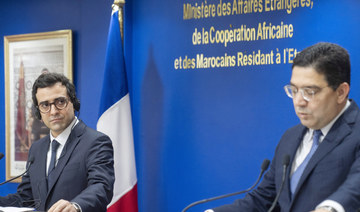RABAT, Morocco: A legal adviser to the European Union’s top court recommended Thursday that it annul an agreement with Morocco which would have allowed European boats to fish off the disputed Western Sahara ‘s coast.
The adviser said the agreement didn’t fully take into account the consequences on the rights of the people of the disputed territory “to benefit from the natural resources of the waters.”
The advocate general for the Court of Justice of the EU backed the court’s earlier ruling and recommended it reject appeals that sought to uphold Europe’s 2019 Sustainable Fisheries Partnership Agreement with Morocco and send the case back to a lower court. The court in 2021 ruled in favor of the pro-independence Polisario Front that the agreement violated the rights of people in the disputed Western Sahara.
The agreement laid out where European vessels with Moroccan permits can fish and included Moroccan-controlled waters west of the disputed territory.
Advocate General Tamara Capeta’s recommendations concluded that the agreement failed “to treat the territory of Western Sahara as ‘separate and distinct’ from the territory of the Kingdom of Morocco.” But she said that Europe could negotiate with Morocco as the territory’s administering power on behalf of residents as long as they’re treated separately.
The court generally follows recommendations from appointed legal experts like Capeta and Thursday’s recommendations strike a blow against Morocco and the European authorities who appealed the ruling. The court will likely consider her recommendations and return with a ruling in the months ahead. Since the four-year accord expired in July, the court’s looming decision can shape future agreements, not any in effect.
Morocco was not party to the case, though trade associations for its farmers and fishermen backed the appeals. Mustapha Baitas, the country’s government spokesperson, underlined on Thursday that the recommendations were non-binding.
“The European Union should, by way of its institutions and member states, assume fully its responsibility for the preservation and protection of the partnership with Morocco in the face of provocations and political maneuvers,” he said, according to the state news agency MAP.
The 2019 Morocco-EU agreement was the latest of a series of accords dating back to 1988 and provided Morocco 208 million euros ($226 million) over four years in exchange for 128 fishing permits, mostly for Spanish boats.
The waters off of the disputed Western Sahara’s 690-mile (1,110-kilometer) coastline are rich in fish such as sardines and sardinella. Morocco also has fishing agreements with Japan and Russia.
The court case is among the ways in which the Polisario Front has pressed its sovereignty claims and put pressure on Morocco’s economic and foreign policy agenda. Its legal challenge was among half a dozen it filed in European Court regarding Moroccan exports and trade.
In a statement on Thursday, the Polisario Front cautioned that the advocate general’s determinations were merely recommendations but it applauded them as favorable, saying “in this legal battle that began a decade ago, great progress has been made.”
The agreement under scrutiny pertains to fishing rights off the northwest African coast but the heart of the issue is about land.
The status of the disputed Western Sahara has been a major sticking point between Morocco and the EU, which sees North African governments as critical partners in fighting terrorism and managing migration. The EU is Morocco’s biggest trade partner and foreign investor.
The territory has been fought over by Morocco and the Algeria-backed Polisario Front since Spain withdrew in 1975. Morocco considers the territory its southern provinces and governs all parts except a sliver near the Algerian border.
Thursday’s recommendations come as an increasing number of countries, including 15 EU members, shift their stances to back a Moroccan plan that would offer the resource-rich territory wide-ranging autonomy but not a referendum toward potential independence.
Though Spain is among the nations that now backs Morocco’s autonomy plan, Polisario Front representatives met with Canary Islands fishermen last summer hoping to strike an agreement to provide their own one-year licenses, Spanish media reported last July.
In linked decisions, Capeta also recommended the court not ban the import of tomatoes and melons from the disputed territory to France but require they be labeled as from Western Sahara, not Morocco.
She also recommended the court side with a European appeal challenging a ruling rejecting tariffs on Moroccan imports. She said extending a tariff agreement Europe made with Morocco on products from the disputed territory shouldn’t be seen as a violation of the Western Sahara’s right to self-determination.































